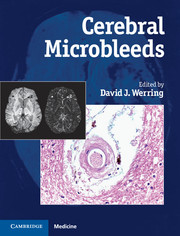Book contents
- Cerebral Microbleeds
- Cerebral Microbleeds
- Copyright page
- Contents
- Contributors
- Foreword
- Preface
- Terminology
- Section 1 Historical aspects, detection and interpretation
- Section 2 Mechanisms underlying microbleeds
- Section 3 Microbleeds in relation to specific populations, diseases and neurological symptoms
- Chapter 9 Cerebral microbleeds in healthypopulations
- Chapter 10 Cerebral microbleeds in relation to cerebrovasculardisease
- Chapter 11 Cerebral microbleeds in relation to hypertensivearteriopathy
- Chapter 12 Cerebral microbleeds in relation to cerebral amyloidangiopathy
- Chapter 13 Cerebral microbleeds and Alzheimer'sdisease
- Chapter 14 Cerebral microbleeds in relation to braintrauma
- Chapter 15 Cerebral microbleeds inCADASIL
- Chapter 16 Miscellaneous conditions associated with cerebralmicrobleeds
- Chapter 17 Cerebral microbleeds and cognitiveimpairment
- Chapter 18 Other clinical manifestations of cerebralmicrobleeds
- Chapter 19 Cerebral microbleeds and antithrombotictreatment
- Chapter 20 Cerebral microbleeds and thrombolysis
- Index
Chapter 10 - Cerebral microbleeds in relation to cerebrovasculardisease
from Section 3 - Microbleeds in relation to specific populations, diseases and neurological symptoms
Published online by Cambridge University Press: 05 July 2011
- Cerebral Microbleeds
- Cerebral Microbleeds
- Copyright page
- Contents
- Contributors
- Foreword
- Preface
- Terminology
- Section 1 Historical aspects, detection and interpretation
- Section 2 Mechanisms underlying microbleeds
- Section 3 Microbleeds in relation to specific populations, diseases and neurological symptoms
- Chapter 9 Cerebral microbleeds in healthypopulations
- Chapter 10 Cerebral microbleeds in relation to cerebrovasculardisease
- Chapter 11 Cerebral microbleeds in relation to hypertensivearteriopathy
- Chapter 12 Cerebral microbleeds in relation to cerebral amyloidangiopathy
- Chapter 13 Cerebral microbleeds and Alzheimer'sdisease
- Chapter 14 Cerebral microbleeds in relation to braintrauma
- Chapter 15 Cerebral microbleeds inCADASIL
- Chapter 16 Miscellaneous conditions associated with cerebralmicrobleeds
- Chapter 17 Cerebral microbleeds and cognitiveimpairment
- Chapter 18 Other clinical manifestations of cerebralmicrobleeds
- Chapter 19 Cerebral microbleeds and antithrombotictreatment
- Chapter 20 Cerebral microbleeds and thrombolysis
- Index
Summary
Keywords
- Type
- Chapter
- Information
- Cerebral MicrobleedsPathophysiology to Clinical Practice, pp. 87 - 98Publisher: Cambridge University PressPrint publication year: 2011

